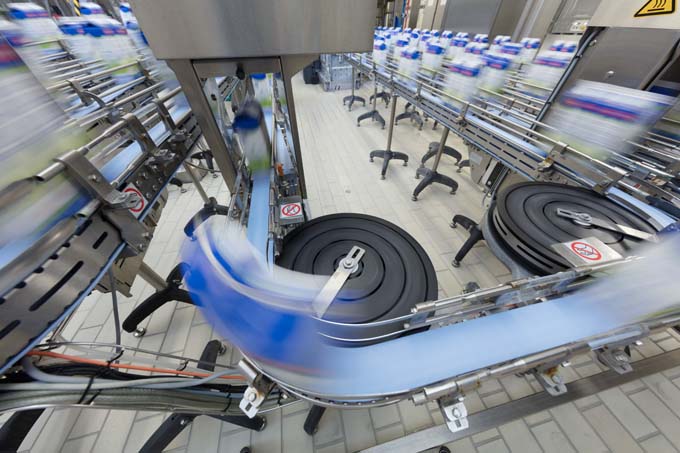MES and automated process control systems for the food industry
Companies in the food industry are not only interested in streamlining processes, increasing productivity and reducing costs. The central issue is the safety of the products manufactured. This is ensured by compliance with legal regulations. This can hardly be achieved with manual work. That's why it makes sense to rely on digital solutions - automated process control systems control and optimize production, and a manufacturing execution system (MES) as a higher-level plant management system creates transparency.

Many medium-sized companies use automated process control systems for their food production. High licensing costs prevent the purchase of unsuitable systems and bad investments - many SMEs simply cannot afford solutions that are too extensive. The process control system is used to operate and monitor the production processes. It provides real-time data to the higher plant management level with systems such as an MES. The quality depends, among other things, on the design, the components, the system architecture and the libraries as the basis of the automation. It can be seen here that breweries, for example, often work with old automation systems, some of which are no longer manufactured. Bakeries often use stand-alone solutions - the dough machine and oven then do not communicate with each other. Dairies have a much more modern setup here - rebuilds are characteristic of this industry, whether of heaters or filling machines, production is changing and automation solutions are constantly being adapted.
Traceability at the touch of a button
An MES, on the other hand, often still represents uncharted territory in medium-sized companies. Its implementation is usually driven by legal regulations and specifications: Manufacturers must be able to guarantee the traceability of the food they produce. For a dairy, this means that the finished yogurt cup must in principle be traceable back to the cow, i.e. the raw material milk and its origin. However, smaller or medium-sized companies in particular cannot always guarantee this digitally across the board. Batch numbers are still documented manually on slips of paper, filed in folders, and mistakes happen quickly. When the inspector arrives, nervousness sets in. This is where companies can benefit massively from an MES: At the push of a button, it can show which batch a yogurt came from, for example, and make the production route to the milk collection truck transparent.
In addition, an MES is the key to making production more efficient: If, for example, a filling machine comes to an unexpected standstill at short intervals, the maintenance department has to spread its diagnostics over a wide area and look at the filler nozzles as well as the carton infeed in order to track down the cause. An MES now records the malfunctions throughout the process. It creates a reporting hit list, and the categories of faults can be displayed graphically. For the maintenance department, this means that it can go on a targeted search for faults and thus eliminate them more quickly. The overview results in a great benefit, as the most serious faults can be identified immediately and thus eliminated.
However, this store floor data collection is only part of the functionality. The MES brings together all the data, including the orders from the ERP. It is therefore an interface between the ERP and the field level, via which evaluations are possible - an ERP alone could not process the flood of data from the field level. With MES, on the other hand, it quickly becomes apparent where exactly in the overall process errors occur - always with the strawberry yogurt? Then action is required.
Automated process control systems also pay off for smaller operations
An MES brings added value to larger operations. A small brewery with process automation, in which all processes are in a few hands, does not need an MES. It knows where the causes of problems lie when decision-makers and production employees are basically the same. From 20 or 30 employees, however, things become more complex. Then the overview is lost more quickly - and the employee is rung out in the night when something doesn't work as expected. With the fault detection of an MES, this can be countered with targeted maintenance, including preventive maintenance. A continuous improvement process also becomes possible with the data from an MES (CIP).

Automated process control systems, on the other hand, pay off even for smaller companies: It allows production of consistent quality with less manpower, thus increasing efficiency and productivity while reducing the error rate. Especially in Europe, personnel costs are a decisive cost factor. The process control system is supervised by one operator - depending on the degree of automation, it can run autonomously. At the same time, it can help to compensate for the shortage of skilled workers, as it takes over tasks from employees.
Find the right partner for customization and implementation
The production process is subject to constant changes - new machines and processes make adjustments necessary and the process control system is adapted according to changes in the production process. It is important that the partner providing support can build on the existing systems, which differ greatly in parts. The focus of the automation specialist planemos from Erlangen in Germany, for example, is not on the pure sale of licenses or process control systems, but on an overarching, individual project solution. In doing so, the existing technology is analyzed and suitable extensions are pointed out - independent of the manufacturer. It is ideal if the focus is not on the sale of own software packages, but on the best possible solution with the existing systems.
In scenarios where what is required can no longer be mapped with the company's own systems, consulting is necessary to find the best possible process control system based on the needs. Part of the implementation can then mean replacing legacy systems and working through an investment backlog. Island systems need to be networked. There are also plants without technical equipment that need to be brought together in the process control system. Here, the communication capability must be established so that all the plants involved can be integrated into the overall structure. This is associated with investment costs. If the partner brings a broad knowledge of process control systems, this experience enables them to be implemented in a shorter time, which reduces costs for the customer.
The implementation of an MES, on the other hand, is often associated with organizational changes in the company, since the organizational and data structure must later fit together. Here, it can make sense to work with a consultant - ideally, there is already contact between him and the technical partner. These adjustments to processes are often the biggest hurdle for companies. It turns out that smaller companies have much greater flexibility here. Companies need a consultancy that starts with the setup and selection and then accompanies the project during implementation: planemos is a specialist for production processes with the corresponding technical know-how.
It is important that the partner not only brings software know-how, but also knows process and food technology. He must understand and internalize the manufacturing process if it is to be implemented in software. This shows that proximity to the manufacturing companies is a decisive advantage, as they speak the same language and can thus develop a solution that serves the operator.
Source and further information: Planemos
Founded in 2012, planemos produces automation solutions for breweries, dairies and food manufacturers. Since 2016 planemos is a certified Siemens partner in the area of Simatic Net and SCADA as well as WinCC Specialist, since 2020 also a certified partner for Siemens Manufacturing Operations Management (MOM) and Opcenter.









